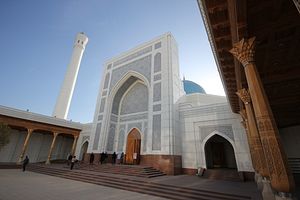On December 18, the U.S. State Department re-designated a host of countries as “Countries of Particular Concern” (CPC) under the International Religious Freedom Act (IRFA) of 1998 for having engaged in or tolerated “systematic, ongoing, [and] egregious violations of religious freedom.”
Among those re-designated were Tajikistan and Turkmenistan. Also re-designated were China, Eritrea, Iran, Myanmar, North Korea, Pakistan, and Saudi Arabia.
Elsewhere in Central Asia, Uzbekistan landed again on the Special Watch List (SWL) for governments that have engaged in or tolerated “severe violations of religious freedom.” The SWL, a new category created by 2016 amendments to the IRFA, is a status below CPC but entails no penalties. Comoros and Russia were kept on the SWL, to which Cuba, Nicaragua, Nigeria, and Sudan were added.
In its statement announcing the designations, the State Department concludes strongly: “No country, entity, or individual should be able to persecute people of faith without accountability. We have acted, and we will continue to do so.”
But as with previous CPC designations for Tajikistan and Turkmenistan, the U.S. government has waived imposing any penalties, presumably on national security grounds. On one hand, the U.S. government recognizes failures to uphold the principles of freedom of religion in these countries; on the other hand, Washington keeps itself from following up with actions more concrete than naming and shaming.
The U.S. Commission on International Religious Freedom (USCIRF), an independent, bipartisan federal body that monitors the status of freedom of religion abroad in order to make policy recommendations to the president, secretary of state, and Congress, welcomed the designations. In a statement, Vice Chair Gayle Manchin said, “Now that these designations have been made, the State Department must take strong action in response, as required by IRFA. We urge the State Department to fully utilize the range of tools available to ensure strong consequences for the most egregious violators, and not rely on waivers or pre-existing sanctions. The CPC-designated countries must know that the United States will not only call them out but also impose costs for violations of this most sacred right.”
On December 26, a notice was published in the Federal Register noting the designations and outlining the secretary of state’s own designation of “presidential actions” to be taken in accordance with the law.
Both Turkmenistan and Tajikistan were, as with in all their previous designations as CPCs, granted waivers “as required in the ‘important national interest of the United States.’”
The IRFA provides a menu of options for a president and his administration, outlined in section 405: public condemnation; cancellation of scientific or cultural exchanges; withdrawal, limitation, or suspension of U.S. development assistance and U.S. security assistance; instructions to U.S. executive directors in international financial institutions (like the World Bank) to vote against loans benefiting the targeted foreign government; restrictions on the issuance of licenses to export any goods or technology to the foreign government; prohibition against the making, guaranteeing, or insuring of loans, or extension of credit by certain U.S. financial institutions to the violating government; and prohibition of U.S. government procurement of goods or services from such governments.
The IRFA, however, also allows the president to waive imposing any of the above “if certain conditions are met.”
Tajikistan has been designated as a CPC since 2016 and Turkmenistan since 2014. Uzbekistan had been designated as a CPC from 2006 to 2018 until it was removed in 2018 and placed on the SWL. All three were granted waivers and never suffered any of the consequences outlined by the IRFA.
In its 2019 annual report, released in April 2019, USCIRF recommended that Tajikistan, Turkmenistan, and Uzbekistan be designated again. In the case of Uzbekistan, USCIRF noted that while “religious freedom conditions in Uzbekistan trended positive in certain areas… serious concerns remain.” USCIRF specifically highlighted that thousands of religious prisoners remain behind bars and those that have been released by the government (all old men) have not been rehabilitated; they remain former convicts with no path to clearing their names. Christian groups, like Baptists and Jehovah’s Witnesses face restrictions and registration difficulties.
The continued designation of Tajikistan and Turkmenistan, but with sanctions waived, illustrates tension between professed U.S. ideals of religious freedom and other interests. The exact reasons are not stated, but it’s assumed the waivers are because of U.S. interests related to the war in Afghanistan and regional security. Beyond Afghanistan, direct U.S. interests — in the economic sphere, for example — in Tajikistan and Turkmenistan are limited. One has to wonder what this process will look like in the event of a U.S. withdrawal from Afghanistan.

































